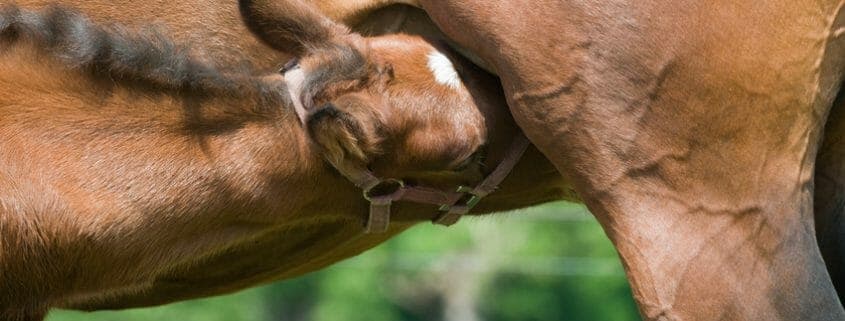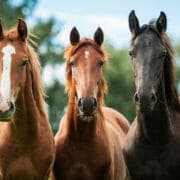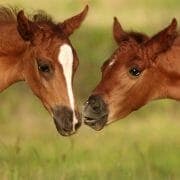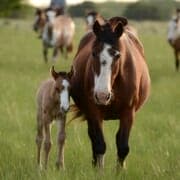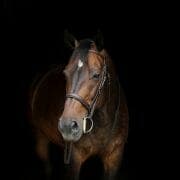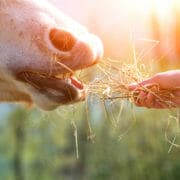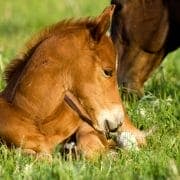Feeding the Lactating Mare
Getting a lactating mare’s feeding right is critical to ensure she can provide milk for her foal and provide the required nutrients for a foetus if she is pregnant again. A balanced diet is also essential to keep the mare healthy so that she can continue to reproduce or go back into work after her foal at foot is weaned.
As for all horses, a mare’s requirement for energy (calories), protein, vitamins and minerals must be met. These nutrients and the role they play in a lactating mare’s diet are looked at below.
Energy
A lactating mare’s requirement for energy is double that needed by a mature idle horse.
Not feeding a lactating mare enough energy means she will lose weight. If she falls below a condition score of 5 (on the Henneke 1 to 9 scale), it may make it difficult to get her back in foal and could also reduce the amount of milk she produces for her foal.
If she is allowed to exceed a condition score of 7 her milk production may fall and it also puts unnecessary pressure on her joints and hooves which will cause pain and lameness for the mare.
The basis of a mare’s energy intake should be provided by pasture and/or hay. If pasture and/or hay is not enough to maintain body condition, high energy feeds like cooked cereal grains, high energy fibres and oils can be added to the diet.
To manage energy intake, you should condition score your lactating mares regularly and adjust their energy intake up if they are losing weight and down if they are gaining weight.
Protein and Amino Acids
Lactating mares need good quality protein to enable them to provide milk for the foal and to maintain their own muscle mass. Not enough protein in a lactating mare’s diet will cause milk production to fall and the mare will begin to lose muscle.
The majority of the protein in the mare’s diet should come from the pasture and/or hay the diet is based on. When there is not enough protein in the pasture/hay to meet a mare’s requirements, good quality protein sources that are rich in essential amino acids such as soybean, lupins, faba bean, canola meal and lucerne or feeds based on these ingredients should be used to meet requirements. Poor quality sources of protein such as cottonseed meal should always be avoided in lactating mare diets.
Because the NRC 2007 lysine requirements (used by FeedXL.com) are now quite high many of you will find that lysine requirements are quite difficult to meet, especially for mares grazing lower quality pastures including the sub-tropical C4 Type pastures. I find the best way to help with meeting lysine requirements is to first add some Lucerne hay to the diet to replace some of the lower quality forage she is eating. Then with this better source of lysine coming from the forage base you will find it a lot easier to meet lysine requirements using appropriate high-quality feeds.
Vitamins and Minerals
Vitamins are extremely important in the lactating mare’s diet and have an impact on the mare’s health and fertility as well as the foal’s growth, muscle development and immune function. Mares with access to green pasture will have the majority of their vitamin requirements met by the pasture alone. Mares with no access to pasture will generally need to be supplemented with vitamins.
A lactating mare has massive requirements for minerals, and particularly for the macro-minerals calcium and phosphorous, which are found in large quantities in milk. It is also important to meet her requirements for trace minerals as they are required to ensure the structural soundness of her future foals.
Not meeting the lactating mare’s requirements for minerals will mean her body reserves are depleted, leaving her susceptible to disease and lameness. Mineral deficiency can also reduce her milk production and fertility and can affect the soundness of future foals.
A lactating mare’s mineral requirements will be partially met by the forage/hay in her diet. However, it is unlikely a mare’s full mineral requirements will be met, so some supplementation will almost certainly be necessary.
Vitamins and minerals can be supplemented in the form of a concentrated vitamin/mineral supplement or in the form of a complete feed, depending on your preference for style of feeding and how much feed your mare needs to maintain body condition.
If your mare is an easy keeper, using a concentrated vitamin/mineral supplement will allow you to provide the vitamins and minerals she needs without providing additional calories that could make her gain unneeded weight. Well formulated balancer pellets are particularly useful for these mares. On the other hand, if your mare is a hard keeper, it would be easiest to use a complete feed that provides the mare with additional calories and protein as well as providing the vitamins and minerals she needs.
Which is the best feed for your mare?
When choosing the right feed and developing a feeding program for your lactating mare(s) you need to consider the following:
-
- Do you have pasture available?
- What sort of pasture do you have and what is its quality like?
- Will your mare maintain bodyweight on pasture alone, or do you need to feed additional feed for her to maintain bodyweight?
- What hay do you have available and what is its quality like?
- Is your mare an easy or hard keeper?
- Does she need to gain, maintain, or lose weight?
- What stage of lactation is she in?
- Do you prefer to feed a complete feed or mix your own feeds using supplements?
The answers to these questions will determine whether a complete feed or a supplement is best for your mare and will also help you determine what amount of feed your mare needs. If your mare is a hard keeper or if you have very little or only poor-quality pasture available a complete feed will most likely be needed. If you have good quality pasture and/or your mare is an easy keeper, you may find a vitamin/mineral supplement is all that is required.
Regardless of what you choose to feed, ensure your lactating mare always has free access to forage in the form of pasture or hay, a salt lick and very clean, fresh water.
FeedXL It!
FeedXL will help you put together a balanced diet that meets the energy, protein, lysine, mineral and vitamin needs of your lactating mare to ensure that she remains healthy and productive during this phase of her reproductive cycle.
And just as importantly, FeedXL will allow you to accurately create diets for your growing foal. A growing horse’s requirements are constantly changing and the future soundness and health of your foal really depends on you getting nutrition right in the formative years of its life. So don’t guess at what you should be feeding (please). Investing a little time now on a good diet for your mare and growing horse can save you a lot of time, frustration and heartache in the future.
Become a Member of FeedXL today
Get EVEN MORE practical and personalised feeding guidance when you sign up to FEEDXL.
Do you have a question or comment? Do you need help with feeding?
We would love to welcome you to our FeedXL Horse Nutrition Facebook Group. Ask questions and have them answered by PhD and Masters qualified equine nutritionists and spend time with like-minded horse owners. It’s free!
Click here to join the FeedXL Horse Nutrition Facebook Group

